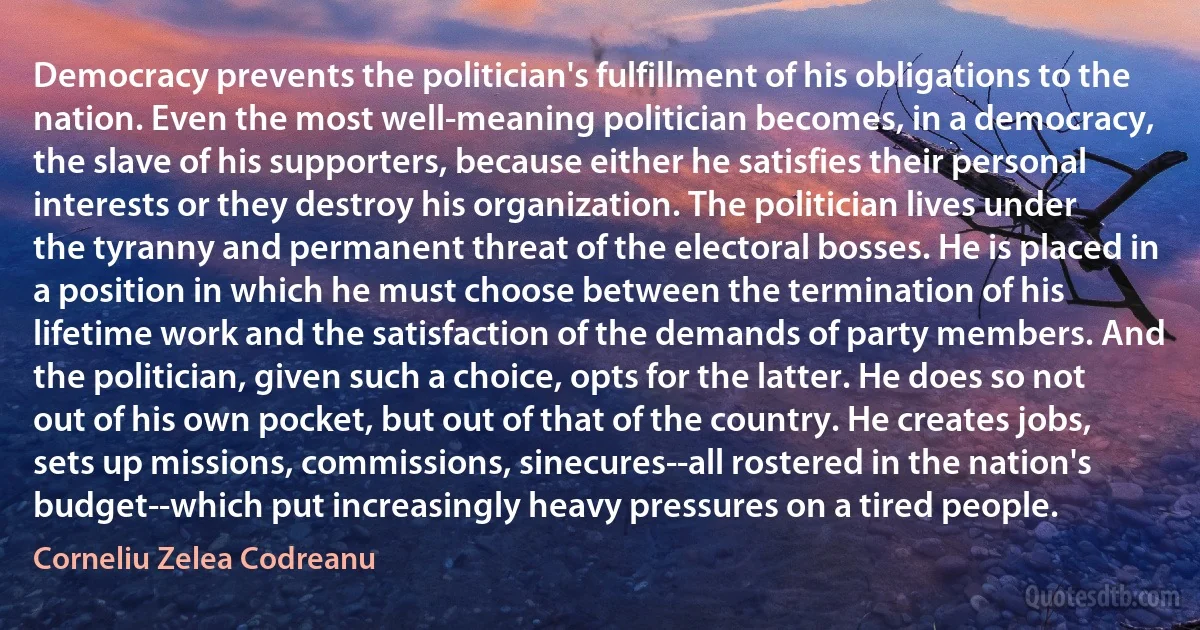
Democracy prevents the politician's fulfillment of his obligations to the nation. Even the most well-meaning politician becomes, in a democracy, the slave of his supporters, because either he satisfies their personal interests or they destroy his organization. The politician lives under the tyranny and permanent threat of the electoral bosses. He is placed in a position in which he must choose between the termination of his lifetime work and the satisfaction of the demands of party members. And the politician, given such a choice, opts for the latter. He does so not out of his own pocket, but out of that of the country. He creates jobs, sets up missions, commissions, sinecures--all rostered in the nation's budget--which put increasingly heavy pressures on a tired people.
Corneliu Zelea CodreanuRelated topics
choice choose country given heavy lives lifetime nation organization party people pocket position slave termination under workRelated quotes
In opposition to the aristocratic valuation (good = noble, beautiful, happy, favoured by the gods) the slave morality then is this: The wretched alone are the good; those who suffer and are heavy laden, the sick and the ugly, they are the only pious ones. On the other hand, you, ye noble and rich, are to all eternity the evil, the cruel, the insatiate, the ungodly, and after death the damned. Whereas noble morality was the manifestation of great self-esteem, a continual yea-saying, slave morality is a continual Nay, a Thou shall not, a negation. To the noble valuation good bad (bad = worthless) corresponds the antithesis of slave morality, good evil. And who are the evil in this morality of the oppressed? Precisely the same who in the other morality were the good.

Georg Brandes
Let us not despair; it is a blessed cause, and success, ere long, will crown our exertions. Already we have gained one victory; we have obtained, for these poor creatures, the recognition of their human nature, which, for a while was most shamefully denied. This is the first fruits of our efforts; let us persevere and our triumph will be complete. Never, never will we desist till we have wiped away this scandal from the Christian name, released ourselves from the load of guilt, under which we at present labour, and extinguished every trace of this bloody traffic, of which our posterity, looking back to the history of these enlightened times, will scarce believe that it has been suffered to exist so long a disgrace and dishonour to this country.

William Wilberforce
Justice is the end of government. It is the end of civil society. It ever has been, and ever will be, pursued, until it be obtained, or until liberty be lost in the pursuit. In a society, under the forms of which the stronger faction can readily unite and oppress the weaker, anarchy may as truly be said to reign, as in a state of nature where the weaker individual is not secured against the violence of the stronger: And as in the latter state even the stronger individuals are prompted by the uncertainty of their condition, to submit to a government which may protect the weak, as well as themselves: so in the former state, will the more powerful factions be gradually induced by a like motive, to wish for a government which will protect all parties, the weaker as well as the more powerful.

Alexander Hamilton
For if experience has ever taught a truth, it is that a plurality in the supreme Executive will forever split into discordant factions, distract the nation, annihilate its energies, and force the nation to rally under a single head, generally an usurper. We have, I think, fallen on the happiest of all modes of constituting the Executive, that of easing and aiding our President, by permitting him to choose Secretaries of State, of Finance, of War, and of the Navy, with whom he may advise, either separately or all together, and remedy their divisions by adopting or controlling their opinions at his discretion; this saves the nation from the evils of a divided will, and secures to it a steady march in the systematic course which the President may have adopted for that of his administration.

Thomas Jefferson
He has a deep contempt for Britain, the British people and parliamentary democracy. He is trying to climb back to power via the Treaty of Rome, and put Britain under government from Brussels for ever. In 1970 Mr Heath solemnly promised that he would not take Britain into the Common Market without the full-hearted consent of the British people. He broke his pledged word then, and he now says he will not accept a 'No' vote on Thursday. Heath promised more jobs and higher living standards inside the EEC. These promises were all broken, and he now tells us we are so poor we cannot come out; beggars can't be choosers. That is false, too. Heath's leadership has been a total disaster for the British people. The Tory Party threw him out.

Tony Benn
